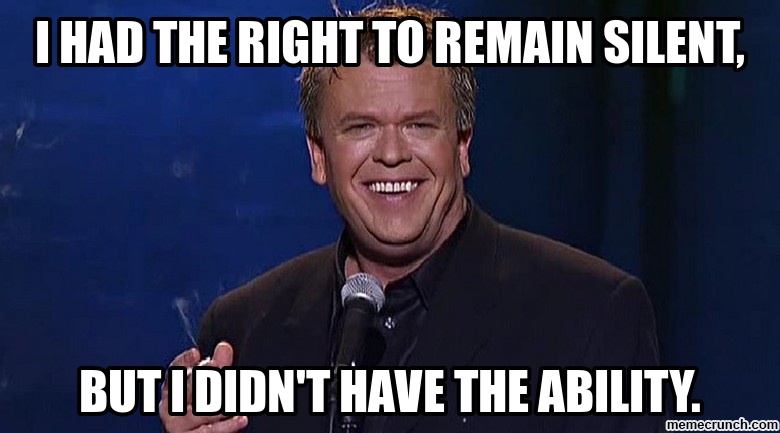First, if you don’t know what the Miranda Rights are, check out our last blog post that will lay the foundation for this one, “I was not Mirandized or read my rights does that mean I can beat my charges?”
To explain this concept, I’m going to tell you the story of a client who would not have had to hire me had he just kept his damn mouth shut, even though he didn’t even break the law.
The Difference Between a Routine Traffic Stop and a Stop Regarding an Ongoing Investigation – When Must the Cops Read Miranda?
We had a unique case in our office recently, where a police officer approached our client and questioned him even after he invoked his right to remain silent multiple times. At issue was the treatment of our client by the police officer. At no time did the police officer read our client his Miranda rights – you know the ones, like from TV – because the officer felt he did not need to; and, even without being read his rights our client asserted his Fifth Amendment right to remain silent, which the officer also ignored. So, the issue in this case was, was this a routine traffic stop, which affords those in our client’s position less rights?
First, a little background. Our client, Defendant in the case at hand, was sitting in the passenger seat of a stopped car when the police officer approached him and young woman sitting in the driver’s seat. From the video obtained from the police officer’s dash camera, the vehicle is not running, and had been stopped for a while, as our client is seen resting his foot lazily outside of the already open passenger side door as the police officer approached.
Our client and his young female counterpart had been parked for some time outside of our client’s grandmother’s residence after returning from the store. Upon reaching the parked car, the police officer begins to question our client and the young lady in the driver’s seat of the stopped vehicle. Our client asks the reason for The police officer’s interaction with them. The police officer tells Our client that the vehicle in question passed nearly a third of a mile away from where the vehicle was parked. The police officer does not cite a traffic violation; rather, he says the reason for his questioning is because the registered owner of the vehicle in question was the subject of a warrant. The officer asked the young woman in the driver’s seat for her name. She gave the officer a fake name, and after several minutes looking for her in the system, it became apparent that she had lied to the police officer when it appeared that no one had the legal name she had given.
When the police officer questioned our client, he invoked his fifth amendment right to remain silent. When questioned again moments later, he told the police officer he would not talk to him. Less than four minutes later the police officer pressed on, asking our client the name of the young lady in the driver’s seat, and he also gave the police officer the name female driver gave, because he knew her by that name. Ultimately, the woman’s true name came out after the driver’s mom called and the Officer asked the woman if he could answer her phone. It was assumed our client knew her real name and he was arrested and charged under A.C.A. § 5-54-102 with one (1) count of Obstructing Governmental Operations, a Class C Misdemeanor. However, we argued that what happened was an apparent violation of our client’s Miranda Rights as well as a violation of his right to remain silent. It was our position that this was not a routine traffic stop, but a stop incident to an ongoing criminal investigation, affording our client more rights than the police officer thought he had.
This facts of our case are very similar to the facts in James v. State, 2012 Ark. App. 118, 390 S.W.3d 95 (2012). In James v. State, the Defendants were approached by a law enforcement officer in the course of a criminal investigation. Like in our case, the Defendants in James were in a parked car outside of one of the defendants’ home. The Arkansas Court of Appeals held that because the Defendants were not pulled over as result of a routine traffic stop, and because the law enforcement officer initiated contact as a result of a criminal investigation, and because the Defendants were not allowed to exit the area out of police control, that the Defendants should have been Mirandized.
The Arkansas Court of Appeals reasoned:
“This is not the scenario envisioned by the Supreme Court when it held that an officer may ask the detainee a moderate number of questions to determine his identity and to try to obtain information confirming or dispelling the officer’s suspicions. See Berkemer, supra. Investigator Chastain blocked the vehicle in the driveway, ordered Ms. O’Dell to remain in the vehicle with her hands on the dash, and demanded that appellant move to the back of the vehicle. He then informed appellant that he knew there were drugs in the vehicle and asked her where they were located. The safeguards prescribed by Miranda become applicable as soon as a suspect’s freedom of action is curtailed to a degree associated with formal arrest. Berkemer, 468 U.S. at 440, 104 S.Ct. 3138. The determination of custody “depends on the objective circumstances of the interrogation, not the subjective views harbored by either the interrogating officers or the person being interrogated.” Hall v. State, 361 Ark. 379, 389, 206 S.W.3d 830, 837 (2005).”
James v. State, 2012 Ark. App. 118, 5–6, 390 S.W.3d 95, 98–99 (2012).
This case is directly on point with the situation our client found himself in. Our client was not pulled over – he was approached in a stopped vehicle in front of his residence. Like the defendants in James, neither he nor the driver had committed any driving offense and were not pulled over as a result of a routine traffic stop. Indeed, the police officer asserted that the reason for his stop was to aid an ongoing criminal investigation, where the registered owner of the vehicle in question had an arrest warrant, and had even cited this in his police report. Like the defendants in James, our client was not free to go (he asked and was denied several times), but was held in an area of law enforcement control, subjecting him to rights under Miranda.
Even though the police officer failed multiple times to issue Miranda rights to our client, our client still unequivocally invoked his right to remain silent on at least two occasions. The Arkansas Supreme Court has held that once the right to remain silent has been invoked, all questioning must cease. Robinson v. State, 373 Ark. 305, 308–09, 283 S.W.3d 558 (2008), citing .Miranda, 384 U.S. at 473–74, 86 S.Ct. 1602 and Ark. R.Crim. P. 4.5 (2007). As a result, anything our client allegedly said in the less-than-four-minutes time frame between his invocation of his right to remain silent, and the police officer’s continued questioning should not admissible in court. Ideally, this would lead to a suppression of any incriminating statements made as a result of ongoing police questioning and ultimately dismissal of the charges against our client.
While we do not in any way advocate allegedly lying to the police, if you have asserted your right to remain silent and were later pressured into making false statements to protect yourself, you may be able to avoid charges for obstructing governmental operations or other similar charges. If you think some of the facts of our client’s case are similar to your case, call our law office to schedule a consultation with an experienced criminal law attorney in Van Buren, Fort Smith, and Fayetteville, Arkansas at (479) 782-1125.



